It is ironic that more than a half century after George Orwell’s death, the famous socialist pundit is perhaps most appreciated by political conservatives. This fact highlights his ambivalent intellectual legacy. But something should also be said about Orwell’s literary legacy, lest we overlook the shortcomings of an otherwise brilliant author.
Liam Julian in his interesting article in Policy Review gets to the heart of the English social critic by revealing him as essentially idiosyncratic and reactive. It is also interesting because what he says about Orwell’s style applies to authorship in general. Art does not just imitate life, it interprets it. Very little writing presents reality in photographic exactitude, and when it does, it is usually bad. With that in mind we should take Orwell’s narratives, like the famous anti-imperialist piece “A Hanging”, with a grain of salt. While the incident described probably never happened, it is the carefully fashioned “authenticity” of Orwell’s prose that gives it didactic power.
The problem is not that he was emotional. Like too many opining “fact-finders,” however, Orwell presented subjective judgment and experience as the truth. The lesson we can take home is that
Bias exists even in the most self-righteously self-proclaimed unbiased people, and individual observations, unguided by accumulated wisdom, are but assorted bits that lack cohesion. It is worth remembering that facts can be dangerous, for when they are unmoored, untethered to past experience and a larger worldview, they can bolster the very theories and systems that violate decency.[1]
Orwell’s saving grace was not only that he was articulate in his outrage, but that he frequently leveled his indignation at worthwhile targets. For example, he was impatient with the sanctimoniousness of animal rights advocates: “there seems to be good reason for thinking that an exaggerated love of animals generally goes with a rather brutal attitude toward human beings.” He had a healthy distrust of pacifism, reacted instinctively against sexual perversion, and candidly discussed the tragedy of abortion. According to Julian
Orwell struggled because his hostility to tradition deprived him of a way of ordering the situations he encountered and concocting lessons from them. He was too beholden to the visceral: His emotive reactions dictated his predictions and proposed solutions and even biased him against accurately rendering the facts he saw.[2]
This contradictory intellectual was a radical in his ideas and respectably bourgeois in his tastes. Fortunately for us, his common sense transcended political boundaries. If alive today, he would no doubt be venting his spleen at the Republican Party. But he would just as likely be ridiculing the glib and perplexing “newspeak” of Democratic operatives. After all, Orwell was a pungent adversary of ideological conformity, whether on the part of plodding Communist hacks or smug establishment liberals.
The Lion and the Unicorn
Orwell’s masterly pamphlet The Lion and the Unicorn: Socialism and the English Genius (1941) is strangely elusive. I first read it in college in the 1980s, in a Penguin edition, but now find it completely absent from bookstores or local libraries. Fortunately the opening (and most interesting) chapter “England Your England” has been reprinted in the anthology Facing Unpleasant Facts, edited by George Packer. Taken as an essay, it is an Orwellian political tour de force. Though a lifelong socialist, the opening lines of The Lion and the Unicorn quickly marked the author out as a renegade from “orthodox” leftism:
One cannot see the modern world as it is unless one recognizes the overwhelming strength of patriotism, national loyalty. In certain circumstances it can break down, at certain levels of civilization it does not exist, but as a positive force there is nothing to set beside it. Christianity and international Socialism are as weak as straw in comparison with it.[3]
On the religious point, Orwell is partially right. There are many examples of Christian peoples whose faith was altered, or even obviated, by ethnic considerations. Yet to what degree is it also possible that the essentials of religion have influenced national characteristics more than the other way around? England is surely not what it was in the days of the heathen Celts and Anglo-Saxons. Even Orwell hesitantly backtracks on this point. Despite the decline of Anglicanism and the limited influence of Nonconformist sects, the English people “have retained a deep tinge of Christian feeling.”
“National characteristics are not easy to pin down, and when pinned down they often turn out to be trivialities or seem to have no connexion with one another…even the fact that Englishmen have bad teeth can tell something about the realities of English life.” Orwell is at his best summing up those features of Englishness that confuse and often madden outsiders. And I think he puts not only foreigners but ideologues in that category. Fascists and Communists alike were unable to appreciate the resiliency and subtlety of nationality, because they thought not in terms of real people but power-hungry abstractions.
Orwell rises above empty labels of abuse in his comments about England’s ruling classes. He may accuse them of “stupidity,” especially in their appeasement of Hitler before the war, but he cannot deny their courage on the battlefield. He likewise absolves them of the treachery and capitulation displayed by various Quislings in occupied Europe. Though sometimes going off on economic tangents, Orwell is an honest observer. He says this about the English intelligentsia: “In the general patriotism of the country they form a sort of island of dissident thought. England is perhaps the only great country whose intellectuals are ashamed of their own nationality.” England is no longer great. How much does it have to do with the implosion of its upper classes or near extinction of religion? One wonders what Orwell would say today.
The Atheist’s Dilemma
In his 1940 review of Malcolm Muggeridge’s social history, The Thirties, Orwell describes the gradual amputation of modern man’s soul—an operation that went mostly unnoticed. Orwell argues that this operation was both inevitable and necessary. “Religious belief, in the form in which we had known it, had to be abandoned.” Yet he acknowledged the terrible vacuum that had been created. Instead of progress, mankind witnessed the worst sort of atavism:
It is as though in the space of ten years we had slid back into the Stone Age. Human types supposedly extinct for centuries…have suddenly reappeared, not as inmates of lunatic asylums, but as the masters of the world. Mechanisation and a collective economy seemingly aren’t enough. By themselves they lead merely to the nightmare we are now enduring… [4]
Malcolm Muggeridge was a disillusioned Marxist but not yet a Christian (he would be in later years). He found himself wistfully recalling snatches of biblical wisdom from his semi-agnostic childhood. Such an outlook is inconsistent with Orwell’s outlook and he clearly desires an alternative.
[I]f one assumes that no sanction can ever be effective except the supernatural one, it is clear what follows. There is no wisdom except in the fear of God; but nobody fears God; therefore there is no wisdom. Man’s history reduces itself to the rise and fall of material civilisations, one Tower of Babel after another. In that case we can be pretty certain what is head of us. Wars and yet more wars, revolutions and counter-revolutions, Hitlers and super-Hitlers–and so downwards into abysses which are horrible to contemplate…[5]
In this respect Orwell was at least more honest than the late Christopher Hitchens, who believed that religion was the primary, if not the sole, instigator of evil and tyranny in the world. There is a paradox at the heart of any atheist’s struggle with religion. People like Orwell may be scandalized by Christian belief (and more so by its imperfect practice). Yet once you remove religion from society, do things really improve?
Orwell on Hitler
A final item is Orwell’s curious review of Hitler’s Mein Kampf, found in the definitive three-volume collection of his letters, essays and articles. It is interesting for being a very un-propagandistic treatment for 1940, written as Britain facing the German Blitzkrieg.
Orwell makes the candid statement that Hitler has his attractive qualities. Otherwise, had the Nazi dictator been no more than an insane clown he would never have come to power. Yet this nutty stereotype lingered for decades after Orwell’s commentary. Only in recent films like The Downfall (2004) and Valkyrie (2008) have more sober portrayals have become possible. They seem to vindicate Orwell’s assessment that
Hitler could not have succeeded against his many rivals if it had not been for the attraction of his own personality, which one can feel even in the clumsy writing of Mein Kampf, and which is no doubt overwhelming when one hears his speeches.[6]
He adds that while he was quite willing to kill the Nazi leader in the interests of humanity: “I should like to put it on record that I have never been able to dislike Hitler… I could feel no personal animosity.” Related to this, the English writer makes a couple of interesting points.
First, Orwell criticized the progressives of his generation for assuming that “human beings desire nothing beyond ease, security and avoidance of pain…short working-hours, hygiene, birth-control…” Hitler seduced an entire people by offering them “struggle and self-sacrifice, not to mention drums, flags and loyalty parades.” It’s not that all these things appealed to Orwell. He was no admirer of jackboots and barracks life (a trait some leftists share with fascists). But he was a patriot and understood the need to fight for a cause, having served in combat on the Republican side during the Spanish Civil War.
Second, Orwell scoffed at facile accusations that Hitler was a creature of “the capitalists” and ”conservatives.” As he states in another essay from the same period, Hitler was essentially a Bolshevik, albeit of the nationalist rather than the internationalist variety. Whether people loved or hated Hitler, they were wrong to think that he was saving Germany from Communism. Nazism was in fact making that country more “Bolshevized.”
Books mentioned in this essay may be found in The Imaginative Conservative Bookstore.
Notes:
- Liam Julian, “Orwell’s Instructive Errors”, Policy Review No. 155 (June 1, 2009).
- Liam Julian, “Orwell’s Instructive Errors”, Policy Review No. 155 (June 1, 2009).
- George Orwell, The Lion and the Unicorn.
- George Orwell, The Thirties.
- George Orwell, The Thirties.
- George Orwell, “Review of Mein Kampf” by Adolf Hitler, The Collected Essays, Journalism and Letters of George Orwell, Volume 2, edited by Sonia Onvell and Ian Angus, (1968).



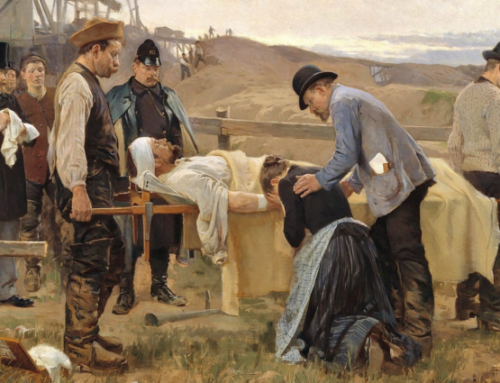
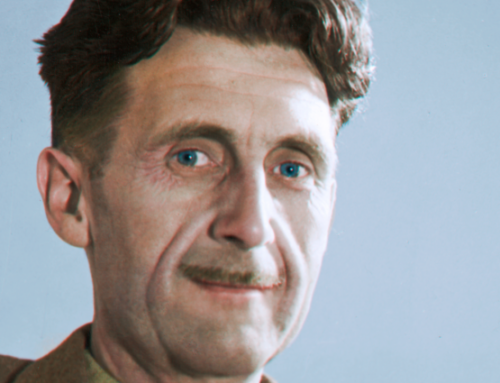
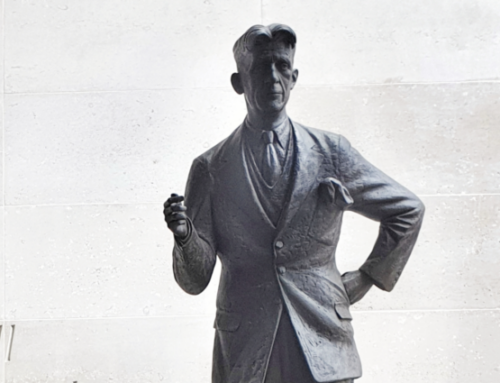
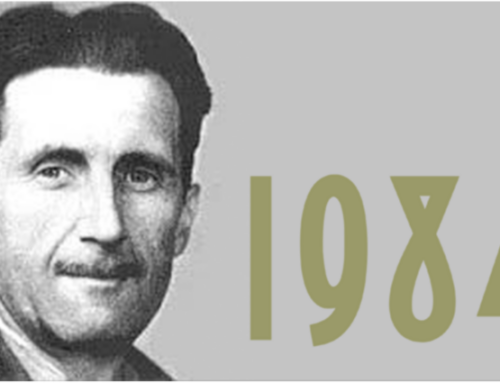
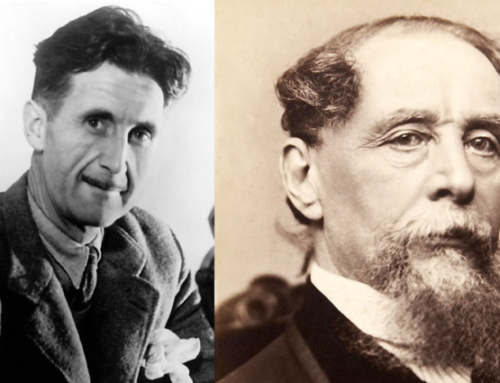
Do you think Orwell wrote 1984 as a warning or to inspire the ruling class and give them a blueprint?
An interesting review. It is quite true that Orwell is not interesting to modern leftists (is anything intetesting to modern leftists?). I have had particular success in making them cringe whenever I bring up Orwell’s ‘Keep the Aspidistra Flying’. The Marxist antagonism towards bourgiouse society of the protagonist, illustrated by his refusal to become a part of the capitalist mechanisms of efficiency vanishes in a flash when he realizes his girlfriend is pregnant and he will need material comforts to provide for woman and child.
My leftist friends hated the story because it blandly illustrated the fact that abortion was the necessary condition for anti-capitalist revolution, and Orwell’s “paradox of Marxism”, they felt, was testimony to his being a slave of traditional morality. The moral dilemna raised by the book was not, in their view, a moral dilemna. The protagonist should have insisted on an abortion and kept drinking and plotting revolution.
I’m not sure I agree with Orwell’s view that the Nazis bolshevized Germany. Under Nazi occupation, the little village outside of Warsaw where I lived for a time had electricity and telephones, as well as Dutch and German families living with the Poles long before the war. During the war, there was a flood and the Nazis had everything ready to evacuate livestock and property.
When the Soviets occupied the village, they removed all the telephone poles and telephone lines and rendered electricity a luxury. My neighbor (now deceased), who fought against the Nazis as a guerilla in the National Army was jailed for 20 years by his Soviet “allies” for not fighting in the People’s Army.
The phone lines that were in the village under Nazi occupation were introduced as a progressive novelty in 1968. Electricity was restored fully and reliably by about 2004. Three years of Nazi occupation did less damage during war than decades of peace time Bolshevism. For all the sins of the Germans, they were not Bolsheviks.